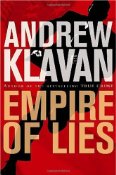
Empire of Lies by Andrew Klavan
 I stumbled upon this book after first happening upon a fascinating interview (see below) done by Peter Robinson as part of the Hoover Institution’s series Uncommon Knowledge. After watching this interview, I was intrigued and borrowed the book from Erich. It provided an interesting break from the serious reading I’ve been in the midst of – see the books in the sidebar. (Note: reading 4-5 books at once doesn’t insure you get through any of them any faster!) Empire of Lies is fast-paced, sometimes uncomfortable, but not enough over the top to make the reader unable to suspend disbelief.
I stumbled upon this book after first happening upon a fascinating interview (see below) done by Peter Robinson as part of the Hoover Institution’s series Uncommon Knowledge. After watching this interview, I was intrigued and borrowed the book from Erich. It provided an interesting break from the serious reading I’ve been in the midst of – see the books in the sidebar. (Note: reading 4-5 books at once doesn’t insure you get through any of them any faster!) Empire of Lies is fast-paced, sometimes uncomfortable, but not enough over the top to make the reader unable to suspend disbelief.
The hero of the story is flawed and his first person narrative is at times brutally honest – to a distasteful degree at some points. However, the honesty is a means of making the hero’s persona believable. The main character, Jason Harrow, is a Christian. But this book doesn’t read like a Tim Lahaye/Jerry Jenkins Left Behind novel, with flat unbelievable Christian heroes. Instead, Klavan delivers a character who, though forgiven, remains flawed and susceptible to temptation. Klavan demonstrates how God uses even Harrow’s worst characteristics for good. In so doing, he removes the remnants of these impulses, by bringing home their consequences to such an extent that the character even contemplates suicide, in spite of the positive outcome.
This isn’t a “great” book, but it is interesting and qualifies as a page turner. However, the reason I’m providing even this cursory review is because of some of the observations that Klavan makes in the course of telling his story. For one, he outlines the cause of American exceptionalism, through a conversation between a drunken TV actor (who I’m almost certain is modeled after degraded version of William Shatner,) and his main character.
“Other countries have bloodlines. History. The ancient earth. Bloodlines that run through history into the ancient earth.”
…
“Americans,” he went on, “All we have is” — he tapped the side of his head with his forefinger — “up here. Ideas. Images. Who we are. What we’re like. What we believe. Stories. Movies. The Bible. The Constitution. TV characters. In our mind. Jesus Christ. Thomas Jefferson …”
The United States is based on imagination and ideas. It is the idea that government exists to serve its citizens and that we are not subjects of an omnipotent state.  It is based on the notion that the government can only be held in check by the indispensable supports of morality and religion as Washington said in his farewell address.
Of all the dispositions and habits which lead to political prosperity, Religion and Morality are indispensable supports. In vain would that man claim the tribute of Patriotism, who should labor to subvert these great pillars of human happiness, these firmest props of the duties of Men and Citizens. The mere Politician, equally with the pious man, ought to respect and to cherish them. A volume could not trace all their connections with private and public felicity…And let us with caution indulge the supposition that morality can be maintained without religion. Whatever may be conceded to the influence of refined education on minds of peculiar structure, reason and experience both forbid us to expect that national morality can prevail in exclusion of religious principle.
This is the implicit theme of Klavan’s book. His hero comes to the realization that the struggle is not about eliminating religion. Atheism is a discredited force in the world. The real struggle is for what kind of God we should believe in. There are,
… basically two different ways in which you could believe in God. You could believe in a God who has spoken one time and then demanded submission ever after to his Word.  Or you could believe in a God who was still speaking, still unfolding his creation to us in the strange equation of every soul and in the unfathomable design thrown up by all our souls together. That God — that second God — requires not submission but liberty, so that every soul can speak, even the errant and foolish ones. … one of these two versions of God has to triumph over the other. They obviously can’t live side by side.
Klavan’s characters are unable to recognize the nature of the struggle. Instead they begin from an irrelevant premise and cannot see what’s right in front of them. Klavan summarizes this in his interview with Peter Robinson ( ~ 12:50). “… we are in an argument about spirituality. This war on terror is a violent argument about God.”
Empire of Lies, is of course, first and foremost, a novel. However, this fiction is no stranger than the truth.
 The posts are coming!
The posts are coming!


0 comments
Kick things off by filling out the form below.
Leave a Comment